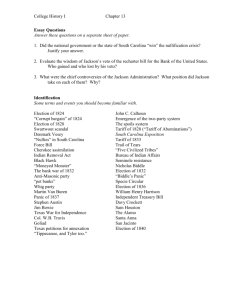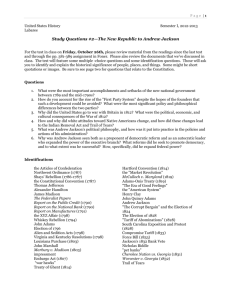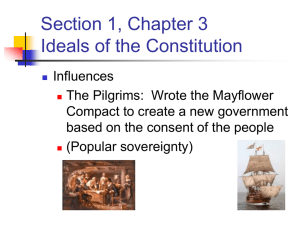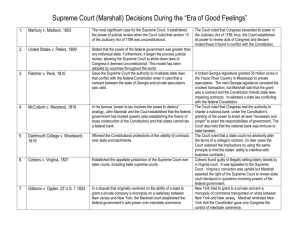During the Jacksonian period the power of the
advertisement
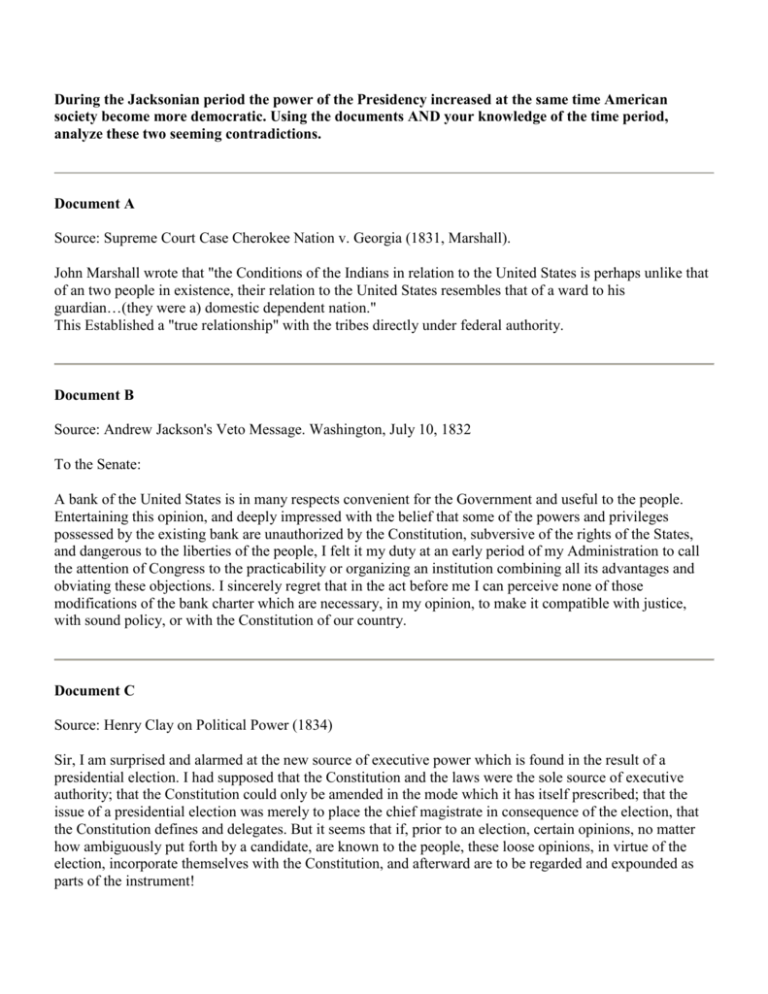
During the Jacksonian period the power of the Presidency increased at the same time American society become more democratic. Using the documents AND your knowledge of the time period, analyze these two seeming contradictions. Document A Source: Supreme Court Case Cherokee Nation v. Georgia (1831, Marshall). John Marshall wrote that "the Conditions of the Indians in relation to the United States is perhaps unlike that of an two people in existence, their relation to the United States resembles that of a ward to his guardian…(they were a) domestic dependent nation." This Established a "true relationship" with the tribes directly under federal authority. Document B Source: Andrew Jackson's Veto Message. Washington, July 10, 1832 To the Senate: A bank of the United States is in many respects convenient for the Government and useful to the people. Entertaining this opinion, and deeply impressed with the belief that some of the powers and privileges possessed by the existing bank are unauthorized by the Constitution, subversive of the rights of the States, and dangerous to the liberties of the people, I felt it my duty at an early period of my Administration to call the attention of Congress to the practicability or organizing an institution combining all its advantages and obviating these objections. I sincerely regret that in the act before me I can perceive none of those modifications of the bank charter which are necessary, in my opinion, to make it compatible with justice, with sound policy, or with the Constitution of our country. Document C Source: Henry Clay on Political Power (1834) Sir, I am surprised and alarmed at the new source of executive power which is found in the result of a presidential election. I had supposed that the Constitution and the laws were the sole source of executive authority; that the Constitution could only be amended in the mode which it has itself prescribed; that the issue of a presidential election was merely to place the chief magistrate in consequence of the election, that the Constitution defines and delegates. But it seems that if, prior to an election, certain opinions, no matter how ambiguously put forth by a candidate, are known to the people, these loose opinions, in virtue of the election, incorporate themselves with the Constitution, and afterward are to be regarded and expounded as parts of the instrument! Document D Source: Supreme Court Case Worcester v. Georgia (1832, Marshall). It established tribal autonomy within their boundaries, i.e. the tribes were "distinct political communities, having territorial boundaries within which their authority is exclusive." Document E Source: Andrew Jackson quoted in 1830 If it be expected that the people of this country, reckless of their constitutional obligations, will prefer their local interest to the principles of the Union, such expectations will in the end be disappointed; or, if it be not so, then indeed has the world little to hope from the example of free government. Document F Source: Map on Indian Removal from 1820 to 1840 Document G Source: "The Downfall of Mother Bank," 1833 Document H Source: Supreme Court Case Charles River Bridge v. Warren Bidge (1837, Taney) The interests of the community are more important than the interests of business; the supremcy of society's interest over private interests. Document I Source: "King Andrew" Political Cartoon, 1832 Document J Source: Graph on Voter Participation from 1824 to 1860



